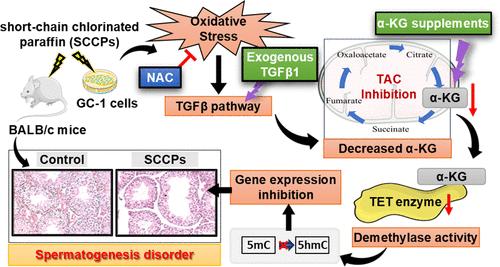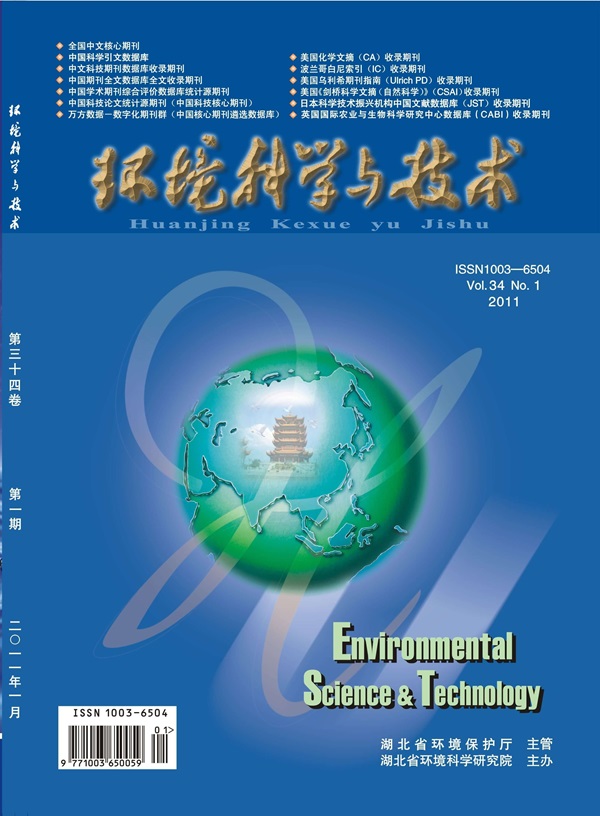Short Chain Chlorinated Paraffins Impaired Spermatogenesis Process in Mice via Inhibiting α-KG/TET Enzyme Activity
IF 10.8
1区 环境科学与生态学
Q1 ENGINEERING, ENVIRONMENTAL
引用次数: 0
Abstract
Short chain chlorinated paraffins (SCCPs) are widely found in various environmental media and potentially threaten human health. However, the toxicity mechanisms of SCCPs to the male reproductive system remain unclear. In this study, male BALB/c mice and GC-1 cells were used to investigate the reproductive toxicity of SCCPs and their molecular mechanisms. SCCPs decreased the content of the tricarboxylic acid cycle intermediate α-KG in testicular cells, thus inhibiting the activity of the DNA demethylase TET enzyme and resulting in an increase in the overall methylation level of the testicular genome. Correspondingly, the promoter demethylation and expression of spermatogenesis-related genes Rbm46, Sohlh1, Kit, and Dmrt1 were significantly reduced by SCCPs, which further prevented the transformation of spermatogonia to spermatocytes and reduced sperm quality in mice. The in vitro experiments suggested that the TGFβ pathway activated by oxidative stress might be an essential reason for inhibiting the tricarboxylic acid cycle and the reduction of α-KG content in testicular cells induced by SCCPs. Overall, this study reveals a novel metabolic regulatory mechanism of SCCPs-induced spermatogenesis disorders, which provides an essential theoretical basis for the prevention of reproductive toxicity of SCCPs.

短链氯化石蜡通过抑制α-KG/TET酶的活性阻碍小鼠的精子发生过程
短链氯化石蜡(SCCPs)广泛存在于各种环境介质中,并可能威胁人类健康。然而,短链氯化石蜡对男性生殖系统的毒性机制仍不清楚。本研究利用雄性 BALB/c 小鼠和 GC-1 细胞研究短链氯化石蜡的生殖毒性及其分子机制。短链氯化石蜡降低了睾丸细胞中三羧酸循环中间体 α-KG 的含量,从而抑制了 DNA 去甲基化酶 TET 的活性,导致睾丸基因组的整体甲基化水平升高。相应地,精子发生相关基因 Rbm46、Sohlh1、Kit 和 Dmrt1 的启动子去甲基化和表达也被 SCCPs 显著降低,从而进一步阻止了精原细胞向精母细胞的转化,降低了小鼠的精子质量。体外实验表明,氧化应激激活的 TGFβ 通路可能是 SCCPs 抑制三羧酸循环和降低睾丸细胞中 α-KG 含量的一个重要原因。总之,本研究揭示了短链氯化石蜡诱导精子发生障碍的新型代谢调控机制,为预防短链氯化石蜡的生殖毒性提供了重要的理论依据。
本文章由计算机程序翻译,如有差异,请以英文原文为准。
求助全文
约1分钟内获得全文
求助全文
来源期刊

环境科学与技术
环境科学-工程:环境
CiteScore
17.50
自引率
9.60%
发文量
12359
审稿时长
2.8 months
期刊介绍:
Environmental Science & Technology (ES&T) is a co-sponsored academic and technical magazine by the Hubei Provincial Environmental Protection Bureau and the Hubei Provincial Academy of Environmental Sciences.
Environmental Science & Technology (ES&T) holds the status of Chinese core journals, scientific papers source journals of China, Chinese Science Citation Database source journals, and Chinese Academic Journal Comprehensive Evaluation Database source journals. This publication focuses on the academic field of environmental protection, featuring articles related to environmental protection and technical advancements.
 求助内容:
求助内容: 应助结果提醒方式:
应助结果提醒方式:


